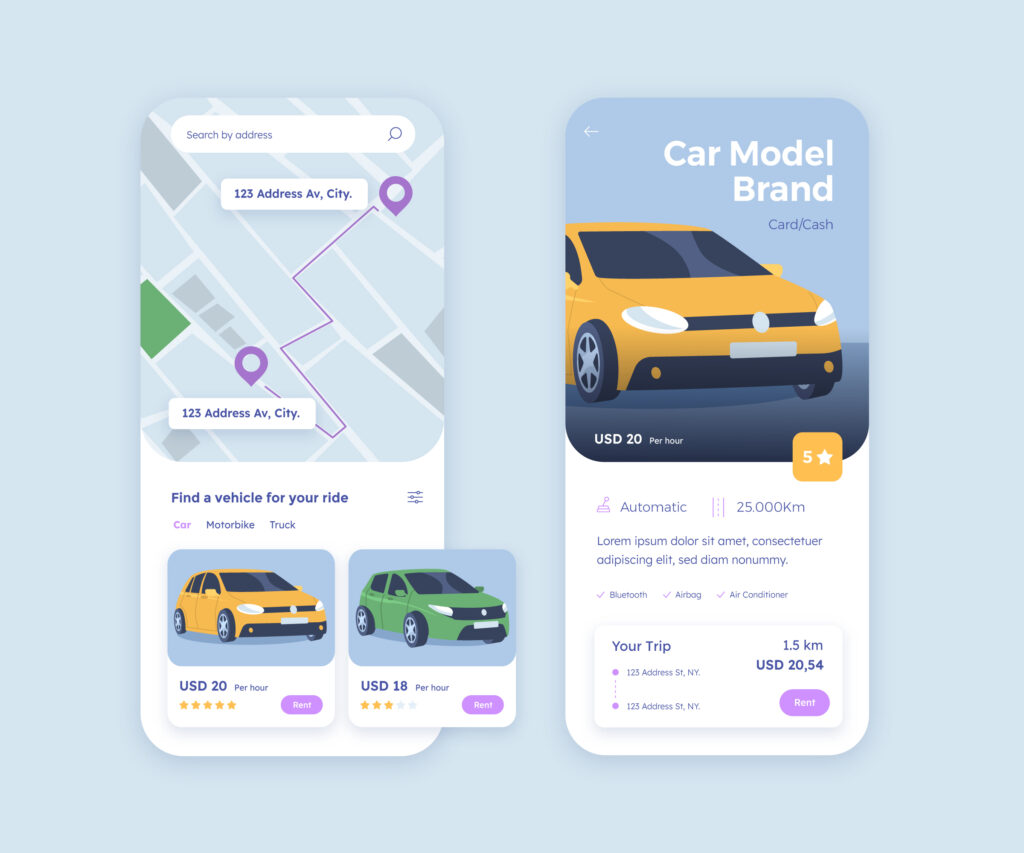In the world of car rentals, digital solutions like Turo have changed the way people rent and list cars. By offering peer-to-peer vehicle sharing, Turo made it possible for car owners to earn money and for travelers to find cars more conveniently. Inspired by this model, many businesses are now interested in launching their own Turo Clone apps. This guide explains how to build a Turo-like app, including must-have features, the required tech stack, and a breakdown of development costs.
Why Invest in a Turo Clone App?
The global car rental market is rapidly expanding with the rise of digital platforms. A Turo Clone app allows entrepreneurs to enter the peer-to-peer car rental space without building a solution from scratch. This business model reduces operational costs, offers flexibility to customers, and ensures better asset utilization for car owners.
Whether you’re a startup or an established business looking to expand, investing in car rental app development is a strategic move. By creating a user-friendly rental platform, you can build a scalable business in a fast-growing market.
Key Features to Include in a Turo Clone App
Building a successful Turo Clone means integrating a set of features that ensure a smooth experience for all users—car owners, renters, and administrators. Below is a breakdown of essential features for each panel.
1. User Panel Features (For Renters)
-
Sign Up/Login: Secure registration using email, phone, or social logins.
-
Search and Filter: Users can search cars based on location, car type, price, and availability.
-
Car Listing Details: View detailed descriptions, pricing, car photos, owner profile, and user reviews.
-
Booking and Scheduling: Renters can choose start and end times, book instantly or request to book.
-
In-App Payments: Secure payment gateway for booking and service fees.
-
Trip Management: Track trip history, extend rentals, or cancel with terms.
-
Ratings and Reviews: Feedback on the car and rental experience.
2. Car Owner Panel Features
-
Profile Management: Upload and manage car details, documents, and owner verification.
-
Vehicle Listing: Add multiple vehicles with pricing, images, and availability.
-
Booking Requests: Approve or reject rental requests based on convenience.
-
Earnings Dashboard: View rental income, payout history, and current bookings.
-
Calendar Integration: Manage car availability based on personal schedules.
3. Admin Panel Features
-
User Management: Monitor and verify users and car owners.
-
Commission Settings: Define platform commission per transaction or car type.
-
Content Management: Manage FAQs, terms, privacy policies, and promo content.
-
Reports & Analytics: Real-time insights into revenue, bookings, and user behavior.
-
Dispute Resolution: Handle complaints and manage refund requests.
Additional Features to Enhance Your Rental Car App Development
To gain a competitive edge, consider integrating advanced features:
-
AI-Based Pricing: Dynamic pricing based on demand, location, and car condition.
-
In-App Chat Support: Direct communication between owners and renters.
-
Geofencing and GPS Tracking: Real-time location monitoring and geo-boundaries for car usage.
-
Multi-Language and Currency Support: Expand to global markets.
-
Loyalty Programs and Discounts: Retain customers and attract repeat rentals.
Tech Stack for Turo Clone App Development
Choosing the right tech stack is essential to ensure a scalable, fast, and secure application. Here’s a suggested stack for rental car app development:
Frontend
-
React Native or Flutter (for cross-platform mobile development)
-
React.js or Vue.js (for web-based admin panel)
Backend
-
Node.js or Ruby on Rails (for server-side logic)
-
Express.js or Django (for web application framework)
Database
-
MongoDB or PostgreSQL (for storing user, booking, and car data)
APIs and Tools
-
Google Maps API (location tracking and search)
-
Stripe/PayPal (secure online payments)
-
Firebase (real-time notifications and analytics)
-
Twilio (SMS and phone number verification)
DevOps and Hosting
-
AWS, Heroku, or DigitalOcean (for hosting)
-
Docker and Kubernetes (for containerization and deployment)
-
GitHub or GitLab (for version control)
Cost of Developing a Turo Clone App
The cost of car rental app development depends on the complexity, features, tech stack, and development team rates. Here’s a rough breakdown:
1. Basic MVP (Minimum Viable Product)
Includes essential features like login, search, booking, payment, and profile management.
-
Cost Range: $5,000 – $10,000
-
Timeline: 3–4 months
2. Mid-Level App
Includes real-time tracking, analytics, push notifications, reviews, and an admin panel.
-
Cost Range: $10,000 – $15,000
-
Timeline: 4–6 months
3. Advanced Turo Clone App
Includes AI-based pricing, GPS tracking, loyalty programs, multi-language support, and scalability enhancements.
-
Cost Range: $15,000 – $25,000+
-
Timeline: 6–9 months
Note: The final cost varies based on the location and experience of the development team. Offshore teams in regions like Eastern Europe or Asia often offer more affordable pricing without compromising on quality.
Monetization Opportunities in a Turo Clone
To make your app profitable, here are some effective monetization strategies:
-
Commission on Bookings: Take a fixed or percentage fee from every successful rental.
-
Featured Listings: Charge car owners to feature their vehicles on the top of search results.
-
Subscription Plans: Offer premium services to car owners or renters.
-
Cancellation Fees: Implement a fee for last-minute cancellations.
-
In-App Ads: Promote related services like insurance or car maintenance.
Conclusion
Building a Turo Clone app is a lucrative business idea in today’s sharing economy. With the right feature set, a modern tech stack, and a thoughtful monetization model, you can create a competitive rental car app development solution that rivals market leaders. Whether you’re targeting a local market or a global audience, focusing on seamless user experience and trust-building is key.
Partnering with an experienced development company can help you streamline the entire car rental app development process, from planning and prototyping to deployment and scaling.


